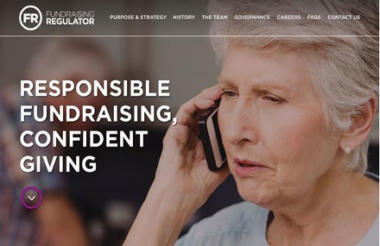Hugh Radojev says that the wording of the Fundraising Regulator's first decision report shows that its primary concern is, was and always will be putting the public first.
At first glance connoisseurs of fundraising regulation could be forgiven for thinking that it's business as usual. But the new regulator's first report shows that there is one key difference between it and its predecssor, the Fundraising Standards Board. It's total focus on the public, over just about anything else.
“The monitoring of Neet Feet’s work that was conducted by the charities appeared, in most cases, to be largely focused on how much money was raised.” So reads part of the executive summary of the Fundraising Regulator’s first ever adjudication decision, published yesterday. “While we are aware of the financial pressures on the sector, we consider that more attention could, and should, have been paid to the experience of the donor”.
The experience of the donor is clearly paramount.
Otherwise, there wasn’t a great deal in the Fundraising Regulator’s first adjudication decision that deviated much from the FRSB adjudication reports of yore. The Codes in question remain - for the moment at least - much the same; so too the language used, and even some of the personnel – specifically the former compliance manager at the old regulator, who now holds the same title at the new.
Focus on the public
Yet the more things stay the same, the more they change. The Fundraising Regulator’s primary regulatory concern is not with the charity, agency or even the beneficiary. No, its primary concern is the wellbeing of the generous British public.
In fairness, Lorde Grade and co have made no secret that this would be their focus. At the very beginning of the year, Stephen Dunmore told Fundraising Magazine that the biggest issue facing the fundraising sector and, by extension, its regulatory body, was the need to “gain the confidence of first the public and secondly of the players in the sector”, i.e.: the charities and the representative organisations themselves.
This, it seems, is the way the wind is blowing. Earlier in the year, the Direct Marketing Association released a white paper which called on fundraisers to “recognise that donors are the most important people in the entire charity process”.
At the time, this call was met with some consternation from fundraisers who maintain that the beneficiary is the most important person in the charitable process.
Fundraisers may well still continue to believe this, but it’s becoming increasingly clear that none of the industry’s watchdogs feel that way.
Fundraisers are now being faced with a choice: either recalibrate their focus away from beneficiaries to the wellbeing of donors in the fundraising cycle, or be monitored, regulated and ultimately judged against a set of standards different to their own.
The first hurdle cleared, just about
The Sun’s exposé into Neet Feet, published on 11 July 2016 - less than a week after the Fundraising Regulator officially launched - was nothing short of a calculated and very public gauntlet thrown down by the redtops to the then new regulatory system.
As we wrote at the time, the Fundraising Regulator couldn’t be seen to fall at the first hurdle – not with the future of fundraising self-regulation at stake.
All this being considered, the Fundraising Regulator took a surprisingly low-key approach to the publication of its first decision. Clandestine ‘priority press briefings’ for the national media aside, there wasn’t a great deal of fanfare from the Fundraising Regulator around the publishing of this report – particularly given how important it was. Or, at least, was made out to be.
In the end, Neet Feet were found guilty of six different violations of the Code of Fundraising Practice and seven charities who utilised the face-to-face fundraising agency’s services have been given a very-public slap on the wrist.
To what end, though?
The agency in question collapsed within two weeks of the article appearing and, as was so often the case with old FRSB reports, the charities caught up in the wake of the scandal claim to have put their house in order long before the report was published.
Also, five of the eight charities ultimately dragged into the investigation had nothing whatsoever to do with Neet Feet’s Bristol branch, where the Sun’s investigation unearthed the shocking evidence of poor practice.
Does just having a contract with an agency mean that you as a charity are immediately complicit in any poor practice, even if it is undertaken in a different part of the country, on behalf of a different charity? And, if so, what kind of precedent does that set?
The regulator maintains that it produced its decision as swiftly as it could – proudly declaring it had produced it within its self-imposed 180 day adjudication deadline – but it’s hard to see how this was any quicker or more effective than anything produced by the FRSB.
It hasn’t fallen at the first hurdle, but at the same time it hasn’t exactly exceeded its predecessor.
Yes, the public is now at the front and centre of the regulatory process but, other than that, the status quo prevails. All this despite the regulator having more staff, more money and, most importantly, greater tools at its disposal than the FRSB ever did.
Related Articles












